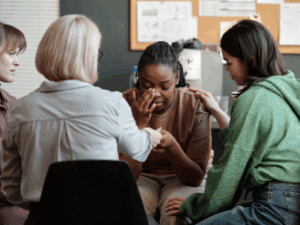
Sexual abuse is one of the most devastating violations a person can endure. It leaves deep emotional scars that can last a lifetime. But the trauma is even greater when the abuse happens in a place where you should have been safe. This could be a school, a hospital, a religious institution, a youth organization, or even a workplace.
When institutions fail to protect those in their care, the damage is twofold. First from the abuse itself, and second from the betrayal of trust. Survivors often ask the question: If the person who hurt me hasn’t been convicted of a crime, can I still take legal action against the institution that allowed it to happen?
The answer is yes. You can bring a civil lawsuit against both your abuser and any institution whose negligence contributed to your abuse, even if there was never a criminal conviction.
Criminal vs. Civil Liability in Sexual Abuse Cases
Many survivors believe that justice can only come through the criminal courts. While criminal charges are one path, they are not the only one.
In a criminal case, the government prosecutes the perpetrator for breaking the law. The goal is punishment, including prison time, fines, and probation. To convict, prosecutors must prove the crime “beyond a reasonable doubt,” which is the highest burden of proof in our legal system.
Not all cases meet that burden, often because evidence is scarce or witnesses are unwilling to testify. That doesn’t mean the abuse didn’t happen. It means the criminal system couldn’t meet its strict standards.
A civil case is different. In a civil lawsuit, you are the plaintiff. You bring the case against the perpetrator, the institution, or both. The goal is accountability and compensation for your potential damages, such as medical costs, therapy, lost income, and pain and suffering.
The burden of proof is lower in civil court. You only need to show that it’s more likely than not that the abuse occurred and the defendant is liable. This standard, known as “preponderance of the evidence,” makes it possible to win a civil case even if there was no criminal conviction.
What Types of Institutions Can Be Held Liable?
Sexual abuse can happen anywhere. And when it does, institutions that had a duty to protect you may be held accountable. That includes:
- Public and private schools and universities
- Religious organizations (churches, synagogues, mosques, dioceses, and their leadership)
- Youth organizations (Boy Scouts, Girl Scouts, sports leagues, or after-school programs)
- Hospitals and healthcare facilities (mental health treatment centers, nursing homes, or rehabilitation facilities)
- Hotels and hospitality businesses with inadequate security or negligent hiring that leads to danger.
- Any workplace or employer that ignores harassment, fails to investigate complaints, or enables abuse.
The key is whether or not the institution had control over the environment and the ability and obligation to protect you.
Their Duty to Protect
When you are under the care, supervision, or authority of an institution, that institution has a duty of care. This means they are legally obligated to take reasonable steps to keep you safe from harm.
That duty includes:
- Hiring qualified, trustworthy staff
- Conducting thorough background checks
- Supervising employees, volunteers, and visitors
- Responding immediately to complaints or warning signs of misconduct
- Implementing safety protocols and reporting requirements
When an institution ignores red flags, fails to investigate, or deliberately covers up abuse, it’s a moral failure on top of negligence. In some cases, it’s gross negligence, which is a reckless disregard for your safety.
About Negligence and Liability
An institution can be found liable for sexual abuse if their actions (or inaction) directly contributed to the harm. This can include:
- Negligent hiring: employing someone with a known history of misconduct or failing to run background checks.
- Negligent supervision: leaving children or vulnerable adults unsupervised with someone who had access and opportunity to abuse.
- Failure to report: ignoring or hiding complaints instead of alerting law enforcement, as required by law in many cases.
- Creating unsafe environments: allowing closed-door meetings, unsupervised overnight trips, or other risky situations without safeguards.
When negligence that falls under these categories leads to abuse, the institution may be held responsible for the harm that followed.
The Statutes of Limitations May Not Be as Short as You Think
Civil cases involving sexual abuse and assault have a statute of limitations, which is the legal deadline to file a lawsuit. In New York, the laws have changed significantly in recent years to give survivors more time.
For many survivors of childhood sexual abuse, the Child Victims Act extended the statute of limitations, allowing lawsuits to be filed until the survivor turns 55. The Adult Survivors Act created a one-year “lookback window” (which closed in November 2023) allowing survivors of adult sexual abuse to sue regardless of when the abuse happened.
Even if you think too much time has passed, it’s worth speaking to a sexual abuse lawyer. There are often exceptions or special rules that can extend your window to file. Waiting too long, however, can close the door permanently. The sooner you ask, the better.
Civil Lawsuits Matter Even if There Was No Criminal Conviction
For many survivors, civil lawsuits offer something the criminal system often can’t:
- Control: you are the one bringing the case and making decisions about settlement or trial.
- Accountability: institutions are forced to confront their failures and, in some cases, change their policies.
- Financial support: compensation can cover therapy, medical bills, lost wages, and other costs associated with your recovery.
- Sending a Message: what happened was wrong, and those who allowed it to happen will be held accountable.
Taking the First Step
If you are a survivor of sexual abuse and believe an institution failed to protect you, you can do much more than seek emotional and medical support. Speaking with an attorney experienced in sexual abuse cases can give you a powerful legal advocate that can help you get justice.
Survivors Choose Morelli Law Firm
At Morelli Law Firm, we’re recognized nationwide for taking on the toughest civil cases and winning. Our world-class attorneys have over 40 years of combined experience and a proven track record of holding powerful institutions accountable for their negligence and misconduct.
We have recovered billions of dollars in verdicts and settlements for our clients, including precedent-setting results in cases involving sexual abuse, discrimination, catastrophic injury, and wrongful death. We are not afraid to go up against corporations, schools, religious organizations, hospitals, or any other institution that has failed to protect those in its care.
We understand that sexual abuse cases are deeply personal and emotionally complex, and we will guide you through every step of the process with respect and privacy. Contact us today for a free case consultation.



